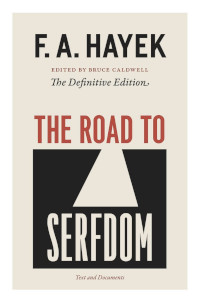The Road to Serfdom is a best-selling political philosophy book by Friedrich Hayek first published in England on 10 March 1944. Reader's Digest published a condensed version in April 1945. It was dedicated "To the socialists of all parties. In it, Hayek criticized the central planning efforts undertaken by nations towards the end of World War II and warned that abandoning individualism and "the principle of laissez faire" would lead to tyranny.
In a 1978 interview with Leo Rosten, Hayek explained that the title's idea came from Alexis de Tocqueville who spoke about "the road to servitude".
Review from LaissezFaireBooks.com, by Jim Powell, July 1994:
The Road to Serfdom—Inside story of a 50-year phenomenon
This year, much has been written about F.A. Hayek's enormously influential classic, The Road to Serfdom. But until now, no one has reported the inside story of how a few devoted friends of freedom helped get the book published in America, despite overwhelming hostility from publishers and the media.
"Friedrich A. Hayek's The Road to Serfdom," political science professor Herman Finer fumed in 1946, reflecting collectivist orthodoxy of the time, "constitutes the most inopportune offensive against democracy to emerge from a democratic country for many decades."
No doubt about it, The Road to Serfdom was explosively controversial from the beginning, especially his case that all forms of collectivism lead to tyranny. The book was first published a half-century ago in Britain by Routledge, March 1944. Nobel Prize winning economist Ronald Coase recalls that during Britain's July 1945 parliamentary election campaign Winston Churchill cited Hayek in his dramatic campaign speeches, to help show that a Labor Party win would mean tyranny. Labor Party leader Clement Atlee ridiculed Hayek and defeated Churchill. Soon afterwards, Atlee began seizing coal, steel, railroads and other businesses, and by 1950 there was forced labor in Britain.
Opposition to Hayek's ideas was fierce in the United States, and a number of publishers rejected the book. But there were friends of freedom who worked wonders. Hayek authorized fellow Austrian economist Fritz Machlup, then working in Washington, to try to find an American publisher, but he was unsuccessful. He gave a copy of the Routledge page proofs to University of Chicago economics professor Aaron Director who met Hayek in 1943 when both were teaching at the London School of Economics. Director passed the page proofs to Frank Knight, founding father of the "Chicago School." Knight apparently gave them to William T. Couch, a classical liberal friend at the University of Chicago Press which agreed to publish the book on September 18, 1944. But since nobody expected it would sell many copies, the initial printing was only 2,000. It was a little wartime edition about 4-7/8ths by 6-3/4 inches.
To help the book gain a hearing, the publishers asked John Chamberlain, respected book editor for Harper's magazine and a devout libertarian, to write a foreword. His name appeared prominently on the cover.
The initial reception was cool. On September 20, 1944, New York Times daily book reviewer Orville Prescott called it a "sad and angry little book."
But then New York Times economics editorial writer Henry Hazlitt weighed in with a home run: a 1,500 word blockbuster review on the front page of the Sunday New York Times Book Review, September 24, 1944. Hazlitt declared that "Friedrich Hayek has written one of the most important books of our generation." The University of Chicago Press ordered another printing. The book sold 22,000 copies by year-end and sold this much again by spring 1945.
Meanwhile, Reader's Digest editors DeWitt and Lila Acheson Wallace expressed interest in publishing an excerpt from the book, and the University of Chicago Press, eager to reach a popular audience, seems to have given away those rights for nothing—Hayek later remarked he never got a penny. In any case, The Road to Serfdom filled the first 20 pages of the April 1945 Reader's Digest under a banner headline drawn from Hazlitt's review: "One of the Most Important Books of Our Generation." This brought Hayek's story to about 8 million people in the U.S. alone. Subsequently, Book-of-the-Month Club distributed some 600,000 copies of a condensed edition.
Sales records are incomplete, but there were a good many more printings after that, and the book eventually sold at least 230,000 copies in the U.S. Hayek went on a U.S. lecture tour, including prestigious places like Harvard University, and he decided he rather liked being a lightning rod for freedom. He expressed his views in popular publications like the Chicago Sun, Boston Traveler and New York Times Magazine. He met many friends of freedom with whom he was to collaborate in later years. Three dozen friends joined him to found the international Mont Pelerin Society.
One of Hayek's friends, Milton Friedman, recalls that "From the time I first read some of his works, and even more from the time in the mid-1940s that I first met Friedrich Hayek, his powerful mind, his moral courage, his lucid and always principled exposition have helped to broaden and deepen my understanding of the meaning and the requisites of a free society."
Today people around the world appreciate Hayek's profound truths which seemed so shocking a half-century ago. ... Now would be a good time for you to discover, or rediscover, Hayek's extraordinary work.
If you would like to acquire an edition of this work, and thus help our work here at Freedom Circle, please click on the product image below:

